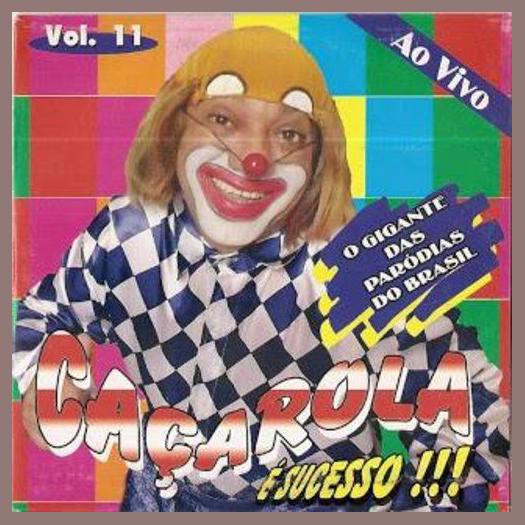 Palhaço Caçarola
Palhaço Caçarola
Palhaço Caçarola: A Journey of Melody, Controversy, and Cultural Impact
Amidst the vibrant tapestry of Brazilian music, Palhaço Caçarola emerged as a band that defied conventions and left an indelible mark on the country's artistic landscape. Their signature song, "Eu Crio Um Cururu," became a timeless anthem that echoed through generations.
Origins and Challenges:
Palhaço Caçarola was conceived in the late 1980s in the northeastern city of Feira de Santana. The band's enigmatic name translates to "clown casserole," reflecting their blend of absurdity and artistry. Their early years were marked by financial struggles and resistance from skeptical critics who questioned their unorthodox approach.
The Rise of a Cultural Icon:
Despite these challenges, Palhaço Caçarola's music struck a chord with the Brazilian public. Their eclectic sound, which drew inspiration from traditional Bahian rhythms, contemporary pop, and experimental electronica, resonated with audiences yearning for something fresh and unconventional.
"Eu Crio Um Cururu," released in 1993, became their breakout hit. The song's infectious melody, poetic lyrics, and imaginative use of found sounds captivated the nation. It topped the charts, won numerous awards, and became an instant classic.
Members and Influences:
Palhaço Caçarola's core members included Léo Cavalcanti (vocals, percussion), Chico Oliveira (guitar, vocals), Edinho Ziquinho (bass), and Luiz Caldas (drums). They were influenced by a diverse range of artists, from the traditional percussionist Jackson do Pandeiro to the experimental composer Tom Zé.
Controversies and Social Commentary:
Palhaço Caçarola's music was not without controversy. Their irreverent lyrics and eccentric stage performances often raised eyebrows, prompting both praise and criticism. However, the band also used their platform to address social issues, tackling themes of poverty, inequality, and cultural identity.
Discography and Legacy:
Palhaço Caçarola released five studio albums throughout their career:
* "Palhaço Caçarola" (1991)
* "Rebobinando" (1993)
* "A Varinha Mágica" (1995)
* "Francisco, o Homem Bomba" (1998)
* "Nossos Dias" (2002)
Their music continues to inspire and entertain new generations, cementing their status as one of the most influential Brazilian bands of the 20th century. Their legacy extends beyond their hit songs, as they played a pivotal role in shaping the country's musical and cultural conversation.
Amidst the vibrant tapestry of Brazilian music, Palhaço Caçarola emerged as a band that defied conventions and left an indelible mark on the country's artistic landscape. Their signature song, "Eu Crio Um Cururu," became a timeless anthem that echoed through generations.
Origins and Challenges:
Palhaço Caçarola was conceived in the late 1980s in the northeastern city of Feira de Santana. The band's enigmatic name translates to "clown casserole," reflecting their blend of absurdity and artistry. Their early years were marked by financial struggles and resistance from skeptical critics who questioned their unorthodox approach.
The Rise of a Cultural Icon:
Despite these challenges, Palhaço Caçarola's music struck a chord with the Brazilian public. Their eclectic sound, which drew inspiration from traditional Bahian rhythms, contemporary pop, and experimental electronica, resonated with audiences yearning for something fresh and unconventional.
"Eu Crio Um Cururu," released in 1993, became their breakout hit. The song's infectious melody, poetic lyrics, and imaginative use of found sounds captivated the nation. It topped the charts, won numerous awards, and became an instant classic.
Members and Influences:
Palhaço Caçarola's core members included Léo Cavalcanti (vocals, percussion), Chico Oliveira (guitar, vocals), Edinho Ziquinho (bass), and Luiz Caldas (drums). They were influenced by a diverse range of artists, from the traditional percussionist Jackson do Pandeiro to the experimental composer Tom Zé.
Controversies and Social Commentary:
Palhaço Caçarola's music was not without controversy. Their irreverent lyrics and eccentric stage performances often raised eyebrows, prompting both praise and criticism. However, the band also used their platform to address social issues, tackling themes of poverty, inequality, and cultural identity.
Discography and Legacy:
Palhaço Caçarola released five studio albums throughout their career:
* "Palhaço Caçarola" (1991)
* "Rebobinando" (1993)
* "A Varinha Mágica" (1995)
* "Francisco, o Homem Bomba" (1998)
* "Nossos Dias" (2002)
Their music continues to inspire and entertain new generations, cementing their status as one of the most influential Brazilian bands of the 20th century. Their legacy extends beyond their hit songs, as they played a pivotal role in shaping the country's musical and cultural conversation.